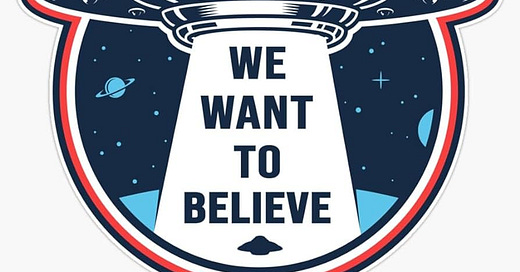Many philosophers hold that we should proportion our degree of belief to the strength of the available evidence. It would be bad epistemic practice to believe without evidence. Imagine someone forming the belief that aliens built the pyramids because someone paid them to believe it. This would be irrational partly due to the lack of evidence.
It stands to reason — if we should base our degree of belief on the evidence — that it would be a bad idea to let what we want to believe dictate what we actually believe. Such a practice would quickly lead us to beliefs that are highly implausible and perhaps even dangerous.
So what gives with the famous phrase — seen on a poster in Fox Mulder's office in the X-Files — ‘I want to believe?’ It expresses Fox Mulder's strong desire to find evidence that extraterrestrials visited Earth. This attitude may strike us as epistemically ill advised, to say the least, because believing based on what we want to believe could be dangerous or a waste of time.
There is, however, an epistemic benefit to wanting to believe that something is true — provided that one doesn't let their desire to believe something override the rationality of belief, where the degree of it belief matches the strength of the available evidence.
What's the epistemic benefit? Mulder alludes to it in the first episode of season seven:
You don't want to believe. You're not looking hard enough.
Here Mulder alludes to why wanting to believe can be epistemically beneficial when tempered by the requirement that beliefs are supported by evidence: the acquisition of knowledge can require gathering evidence. One motivation for expending the time, effort, and opportunity costs — if you're gathering evidence, you often cannot do other stuff — to acquire such evidence is wanting to believe the claims the evidence supports.
That doesn't mean that one will find evidence to support what they want to believe. However, it does provide the impetus for seeking out evidence that, if found, would support what one wants to believe. The trick is not allowing what one wants to believe to override the evidence. Easier said than done. And in cases where you do not want to believe, or remain indifferent, there are fewer motivations to seek out evidence for such beliefs.
Perhaps wanting to believe — when tempered by the requirement for sufficient evidence for belief— isn't totally epistemically bad. It may be necessary, sometimes, to motivate seeking out evidence.






This is a really thought-provoking argument, and I appreciate the distinction you're making. You’re right to point out that wanting to believe isn’t necessarily epistemically problematic if it’s kept in check by a commitment to sufficient evidence. There’s a lot of value in recognising how desire can motivate the search for knowledge, but I think it raises some interesting philosophical questions.
First, while you’re correct that beliefs should be proportioned to the available evidence, can this apply universally? In some cases—like moral or existential beliefs—evidence might be scarce or ambiguous. Philosophers like Kierkegaard argue that in such situations, belief without concrete evidence can still be rational. Would this suggest there are contexts where the evidence-first rule might need some nuance?
Now, I agree that Mulder’s “I want to believe” captures a legitimate epistemic motivation—it can drive inquiry. But doesn’t this also risk introducing subtle biases? When we want something to be true, we might unconsciously seek out evidence that supports our desired belief and overlook evidence to the contrary. Even if we aim to proportion our beliefs to evidence, it’s tough to entirely disentangle our desires from how we process that evidence. How do we avoid confirmation bias while still allowing motivation to fuel the search for knowledge? After all, the X-files had this tension as a driving force - Scully was the evidence based scientist for Mulders more conspiratorial claims
Finally, there’s an underlying tension between motivation and interpretation. While it’s clear that wanting to believe can motivate evidence-gathering, can we ever really ensure that the desire doesn’t creep into how we interpret that evidence? Take the case of a scientist, Sarah, who is motivated by her desire to believe in a revolutionary theory. She spends years gathering evidence, but even though she’s committed to proportioning her belief to that evidence, her strong motivation subtly influences how she evaluates the data. Even if the desire to believe is tempered by a commitment to evidence, it still poses a risk of distorting how we engage with that evidence.
So, while the argument rightly acknowledges the dangers of desire overriding evidence, I wonder if we can really maintain the fine balance between desire as motivation and evidence as the determining factor. Even when we’re careful, unconscious biases can sneak in, making it difficult to ensure that the motivation doesn’t skew our conclusions.
What are your thoughts on how we can strike this balance more effectively?